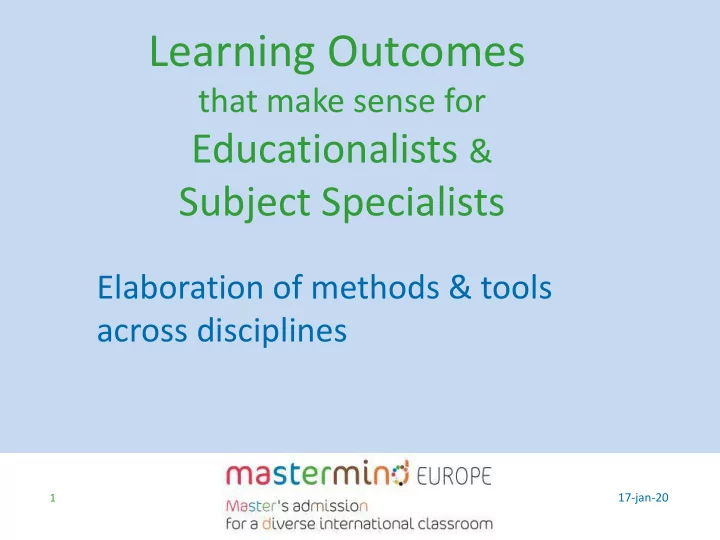

Learning Outcomes that make sense for Educationalists & Subject Specialists Elaboration of methods & tools across disciplines 17-jan-20 1
Key messages presentation 1 1. Master’s education is getting too diverse to define one set of research competencies 2. Research competencies are not restricted to subject-specific knowledge & skills; they also encompass General Academic, Personal and Linguistic competencies 3. High quality Master’s programmes need a coherent framework of research competencies and related learning outcomes 17-jan-20 2
Key messages presentation 2 1. Learning outcomes are crucial to improve competencies of Master’s graduates 2. Master’s programmes need Learning Outcomes in: Subject, Academic, Personal, & Linguistic skills 3. Assessment of Learning Outcomes is subjective, at best intersubjective 17-jan-20 3
Key messages presentation 3 1. Learning outcomes have to make sense to you and your colleagues 2. Common sense is a good approach 3. Progressive performance descriptors are a) necessary and b) possible 17-jan-20 4
Key messages presentation 3 1. Learning outcomes have to make sense to you and your colleagues 2. Common sense is a good approach 3. Progressive performance descriptors are a) necessary and b) possible 17-jan-20 5
1. Learning outcomes that make sense • Dublin descriptors: circular & not specific • NQA: National Quality Assurance protocols: – Based on educational theory and approach – Often not so meaningfull for other disciplines – → bureaucratic ticking boxes 17-jan-20 6
1. Learning outcomes that make sense • We need Learning outcomes that – Are meaningfull across disciplines – Go beyond ‘criteria’ to also ‘ norms ’ • Criteria: What need students to be good at? • Norms: What is the difference between “ good enough ” and “ not good enough ”? 17-jan-20 7
2. Common sense is a good approach • Sit down with your senior teaching professors • Use their implicit knowledge & expertise • + : close to the heart and experience of the academics • Possible - : each university / Master’s their own approach? Not necessarily 17-jan-20 8
3. Existing “ progressive performance descriptors ” • AACU VALUE Rubrics • Common European Framework of Reference https://www.aacu.org/value-rubrics https://www.coe.int/en/web/common-european-framework-reference- languages/level-descriptions 17-jan-20 9
3. “ Progressive performance descriptors ” • AACU VALUE Rubrics – Developed for Bachelor’s in the US – 16 competencies: academic and personal Creative thinking Integrative learning Quantitative literacy Critical thinking Lifelong learning Reading Information literacy Problem solving Written communication Inquiry and analysis Civic engagement Global learning Oral communication Ethical reasoning Intercultural knowledge & Teamwork competence 17-jan-20 10
3. “ Progressive performance descriptors ” • Strength of AACU VALUE Rubrics – Subdivision of competencies in meaningful aspects – Progressive performance descriptors 17-jan-20 11
3. “ Progressive performance descriptors ” • Strength of AACU VALUE Rubrics – Subdivision of competencies in meaningful aspects Critical thinking Explanation of issue / definition of problem Selecting and using evidence Influence of context and assumptions Student’s own position Conclusions, implications, consequences For each of the 16 competencies, 5 or 6 such dimensions 17-jan-20 12
3. “ Progressive performance descriptors ” • Strength of AACU VALUE Rubrics – Subdivision of competencies in meaningful aspects Critical Explanation of issue / definition of problem thinking Level 1 Issue stated without clarification or description Level 2 Issues stated, but with undefined terms, ambiguous, unclear boundaries or backgrounds Level 3 Issue stated so that understanding is not seriously impeded Level 4 Issue stated comprehensively, fully understandable 16 x 5-6 x 4 levels = 352 performance descriptors 17-jan-20 13
3. “ Progressive performance descriptors ” • Common European Framework of Reference – Developed by the Council of Europe – Widely used: European Union, Universities, Languages school 17-jan-20 14
3. “ Progressive performance descriptors ” https://www.coe.int/en/web/common-european-framework-reference-languages/level- descriptions 17-jan-20 15
3. “ Progressive performance descriptors ” • Strength of Common European Framework of Reference for Languages – 6 levels, 5 specific linguistic competencies A1 A2 B1 B2 C1 C2 → → → → → Listening Reading Spoken interaction Spoken production Writing 17-jan-20 16
3. “ Progressive performance descriptors ” • Strength of Common European Framework of Reference for Languages – 6 levels, 5 specific linguistic competencies Listening A1 A2 B1 B2 C1 C2 Recognise familiar Understand main Understand words/phrases points of standard extended speech concerning speech on familiar even when personal context; matters in class, unstructured and when people work, TV when implicit. speak slowly and speech is slow and Understand film clearly clear and tv easily 17-jan-20 17
3. Existing “ progressive performance descriptors ” • AACU VALUE Rubrics • Common European Framework of Reference Two examples of Learning Outcomes ❑ That may make sense across disciplines ❑ Are specific in their subdivisions ❑ Have progressive performance descriptors Use them or make your own! 17-jan-20 18
Key messages presentation 3 1. Learning outcomes have to make sense to you and your colleagues 2. Common sense is a good approach 3. Progressive performance descriptors are a) necessary and b) possible 17-jan-20 19
Key messages presentation 2 1. Learning outcomes are crucial to improve competencies of Master’s graduates 2. Master’s programmes need Learning Outcomes in: Subject, Academic, Personal, & Linguistic skills 3. Assessment of Learning Outcomes is subjective, at best intersubjective 17-jan-20 20
Key messages presentation 1 1. Master’s education is getting too diverse to define one set of research competencies 2. Research competencies are not restricted to subject-specific knowledge & skills; they also encompass General Academic, Personal and Linguistic competencies 3. High quality Master’s programmes need a coherent framework of research competencies and related learning outcomes 17-jan-20 21
Recommend
More recommend